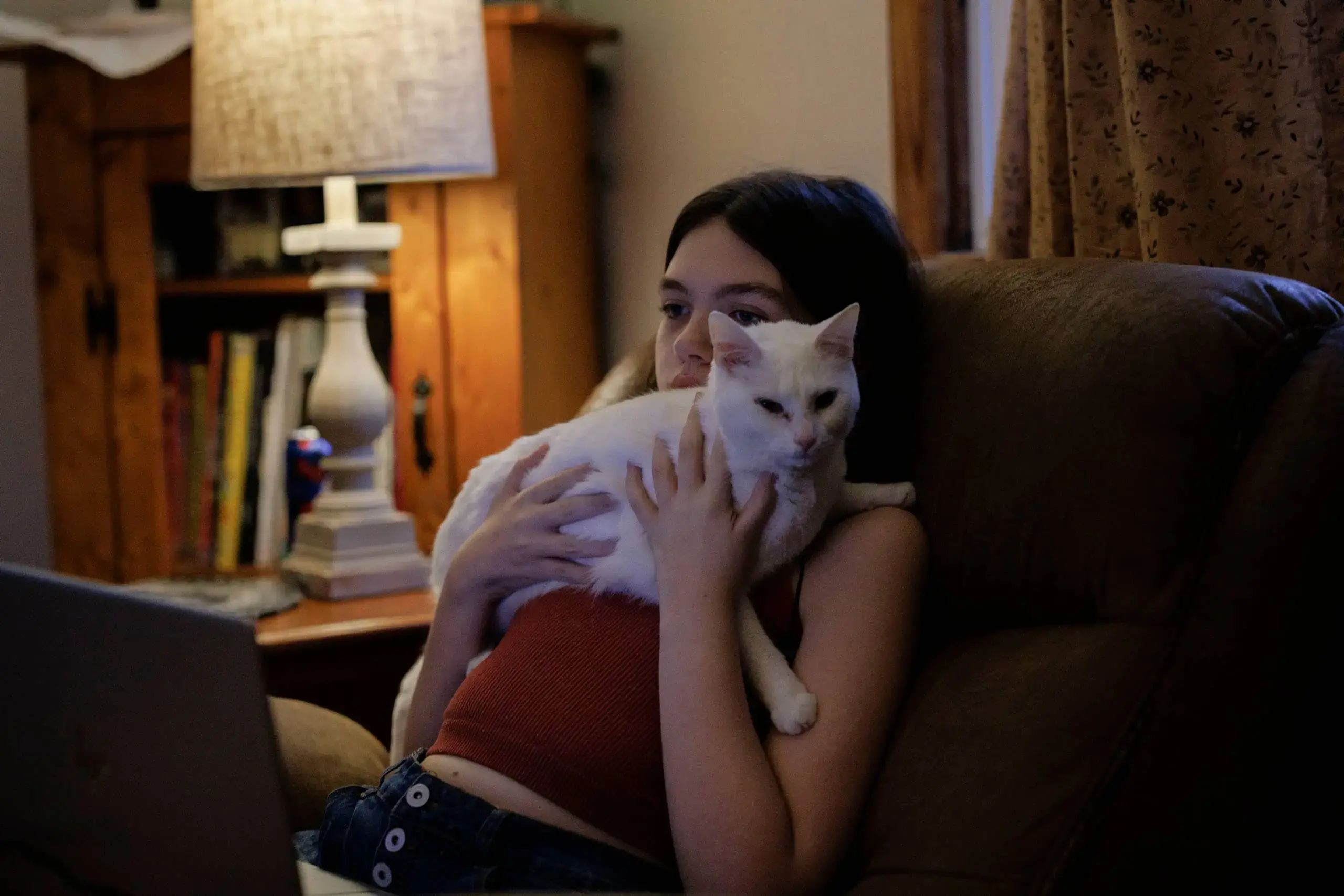
Reporting and Resources on Mental Well-Being in the U.S.
Young people in the U.S. are often labeled as disengaged or apathetic, but I would use a different word: overwhelmed.
The next generation has come of age in an increasingly digital, polarized, and climate-threatened world. Many of us struggle to balance a deep concern for global issues with the need to safeguard our mental well-being. In 2023, after the COVID-19 pandemic, the U.S. surgeon general declared an epidemic of loneliness and isolation, calling it a public health crisis. Caring for mental health is not taking a step back—it is necessary to protect our health and sustain the energy required to meet the challenges ahead.
This May, in honor of Mental Health Awareness Month, the Pulitzer Center amplifies reporting that interrogates the critical intersections of mental health and technology, climate change, welfare systems, and migration.
Reporting related to mental health
The Pulitzer Center recently hosted a virtual screening of Sparni, a documentary produced by Reporting Fellows Ania Gruszczyńska and Nathan Siegelaub. The film follows a young musician dealing with mental illness. Watch the screening Q&A recording by clicking here.
Recognizing the emerging crossover between AI and health, our AI Accountability reporting investigated how dating app companies keep reports of sexual abuse under wraps. Another story explored the world of AI “companion” chatbots and how they could cure—or worsen—the loneliness epidemic.
As anxiety is heightened by uncertainty due to climate change, Quinn Glabicki’s Hollowed Out photo exhibition, debuting at the Photoville Festival in June, and Stephanie Hanes’ The Climate Generation project offer poignant portraits of resilience in the face of environmental injustice.
People in the child welfare and criminal justice systems are some of the most vulnerable to mental health crises. Our human rights reporting projects—which include Trouble in Texas, Colorado: Crisis Response in the Valley, and Fostering Harm—investigate mental well-being within these systems in the United States.
Our journalist grantees also report on the well-being of immigrants and people displaced by conflict. Haitian immigrants in Boston, South Sudanese immigrants in the Midwest, and families fleeing conflict in India to California’s Bay Area all grapple with questions of livelihood and belonging in their new communities.
Through stories that recognize mental health as a vital public health concern, we hope to deepen understanding, inspire conversation, and spark change. Look out for more mental well-being content from us on Instagram this month!
Resources on mental health
Are you looking for resources to open up dialogues about mental well-being with the young people in your life? Whether you are an educator, family member, or otherwise in community with youth, we commend you for making space for difficult conversations and emotions. These resources offer practical ideas for navigating these conversations and facilitating lessons. We hope they can also serve as a catalyst to continue your inquiry into mental health, and the resources available to you and to young people on a local level.
- “Youth Mental Health and Suicide Prevention: Listening Guide for Educators”: This listening guide supports reflection on Conversations with Sydney, a solutions-oriented podcast series exploring effective ways for parents, teens, teachers, and communities to respond to the crisis of teen mental health and suicide. Each episode delves into father-teen duo Micah and Sydney Fink’s personal experiences opening up conversations about mental health at home. They also interview teens, researchers, and leading mental health experts to explore questions about youth mental health.
- “Media Literacy and Mental Health: Webinar on Demand”: In this webinar for educators, three teachers discuss how they have used media literacy skillbuilding to support students’ mental well-being, and the importance of educators caring for their own mental health. As elementary educator Lisa Holewa summarizes, "Media literacy ... helps students connect to their own power and lessen their anxiety about the world."
- Recipes and Roadmaps for Healing: In this six-lesson unit plan for high school classrooms, students explore the root causes of trauma through engagement with journalism and self-reflection activities. They ultimately compose a “recipe book for healing,” such as this one by students in a Kansas City, Missouri, classroom. This unit was written and taught by high school English teacher Karen Sojourner during the Pulitzer Center’s 2022-23 Teacher Fellowship program.
- Fighting Words Poetry Contest: The Pulitzer Center’s annual poetry contest invites students in primary and secondary schools worldwide to respond to the news through poetry. This is an exercise in close reading, critical thinking, and creativity, but also in empathy and emotional processing. The resulting poems represent informed, empowered action on current events. Many highlight the connection between global issues and mental well-being, such as Aigerim Bibol’s poem about the impact of AI algorithms that objectify and erase women in the digital landscape, and Charisma Holly’s ode to the personal and planetary healing potential of sustainable agriculture techniques. Entries to the 2025 contest are due on May 11 at 11:59pm EDT.
A shorter version of the text above first appeared in the May 9, 2025, edition of the Pulitzer Center's weekly newsletter. Subscribe today.
Click here to read the full newsletter.

.jpeg.webp?itok=KLozoLb4)




.png.webp?itok=730BIm52)